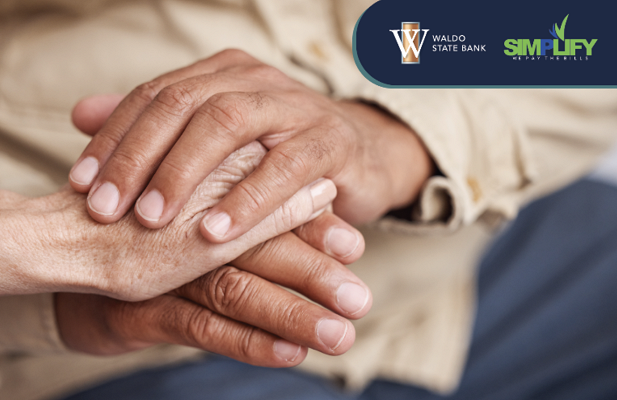Elder Abuse Awareness Month

June is Elder Abuse Awareness Month, and the team at Waldo State Bank (WSB) wants to raise awareness about the abuse that many older adults face. According to the Center for Elder Justice and Education, an estimated one in ten Americans aged 60 years or older have experienced some form of abuse.
Preventing Elder Abuse in Your Community
Elder abuse is often done by the people closest to them, like caregivers and family members. Because of this, these incidents are frequently unreported, with victims subject to continued abuse.
Understanding the different types and signs is important to prevent elder abuse. This knowledge will help you protect those who are most vulnerable.
Understanding Elder Abuse
Before we discuss how to spot elder abuse, it’s essential to know the different forms to look for. In general, elder abuse refers to any situation where someone intentionally harms or puts an elderly person at risk. It includes scenarios where a person’s actions or inaction can cause harm.
People often see physical abuse in elder abuse cases. However, people can also harm or take advantage of the elderly in other ways. These can include emotional abuse, financial exploitation, neglect, and even sexual abuse.
One of the overlooked types of elder abuse is financial abuse, when senior financial safety is at risk. In this situation, someone close to the elderly person takes advantage of their money without permission.
Here are the main types of elder abuse:
• Physical abuse
• Neglect or abandonment
• Financial abuse
• Sexual abuse
• Emotional abuse
How to Spot Elder Abuse
As you now know, elder abuse can take many forms, so the possible signs of abuse can vary significantly from case to case. Now, we will go over some common signs of elder abuse. Remember, you may discover other signs that are not listed here.
• Cuts or scrapes, bruises, broken bones, sprains, or burns
• Malnourishment, dehydration, or unexplained weight loss
• Unclean clothing or living spaces
• Poor personal hygiene
• Isolation from friends and family
• Feeling scared or withdrawn
• Missing belongings or possessions
• Changes to authorized users on the elderly person’s checking or savings account
• Unpaid bill notices
• Unusual withdrawals or spending patterns
If you suspect elder abuse is occurring and your loved one’s well-being is compromised, check in with them to inquire about the situation. Call 911 if you believe they are in immediate danger.
How WSB is Raising Awareness
WSB and Simplify are working together to provide personal hygiene and paper products to community members in need. This is to help raise awareness about elder abuse.
During June, we are accepting donations of in-demand items that Simplify will distribute. Help us make a difference for Elder Abuse Awareness Month.
You can drop off donation items in our lobby until June 30th. Join us in supporting this important cause. Your donations will make a difference.
• Shampoo and conditioner
• Toothpaste
• Body wipes
• Deodorant
• Body wash
• Feminine hygiene products
• Liquid hand soap
• Lotion
• Shaving cream
• Disposable razors
• Paper products
• Wet wipes
As a local banking solution, WSB takes pride in supporting all community members, especially the elderly. We want young people to learn about abuse signs and speak up for those who can't. Protect your loved ones by being informed and standing up for them.
Teaching young people about money and finances can help them recognize financial abuse in their community. Teach kids not to share personal or financial info, cards, or card photos, and check bank statements often. Visit our website to learn more about Waldo State Bank and our personal banking solutions.